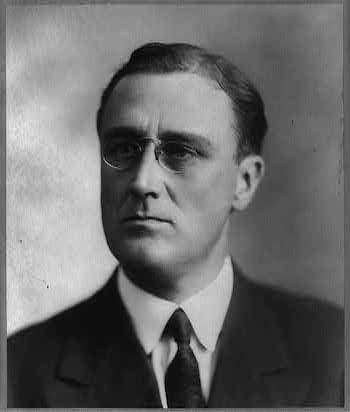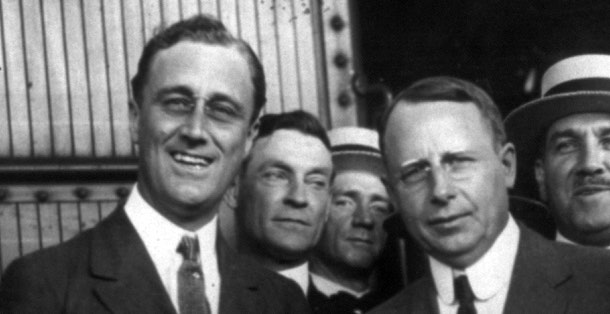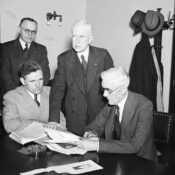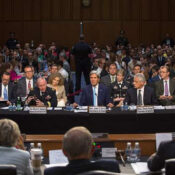Lost in the noise and excitement of a presidential campaign is the quieter contest for the vice presidency. With few exceptions (the 2008 competition between Joe Biden and Sarah Palin being one), it never draws the same public interest as the presidential race because it’s really not a contest between vice presidential candidates.
The vice-presidential hopefuls are more or less surrogates for their presidential running mates. And once elected, the vice president’s job doesn’t draw much fascination from the public. The VP presides over the Senate, attends public functions not important enough to merit the president’s attendance, and, of course, remains ready to step into the big job if the president is killed or incapacitated.
Long before he ran for president, Franklin Delano Roosevelt tried out for the Veep’s job. He’d been appointed assistant secretary of the Navy in 1913 and worked in that capacity through the First World War. Shortly afterward, he was offered a chance to campaign with the Democratic presidential nominee of 1920, James M. Cox.
Being chosen as Cox’s running mate was a step up for FDR, but he was under no illusions about the importance of the VP position. He envisioned bigger things for the office. And so, in 1920, the Post published his article, “Can the Vice President Be Useful?” in which he suggested a new role for the vice president that would help make Congress more efficient.
We aren’t giving away anything by telling you that no one took up Roosevelt’s suggestion. Still, it’s an intriguing idea to give the VPOTUS more substantial work for the position’s $230,700 annual salary.
Can the Vice President Be Useful?
By Franklin D. Roosevelt, Reported by Donald Wilhelm
Excerpted from an article originally published on October 16, 1920

Library of Congress
There is probably no better example of what might be called the industrial waste at Washington than is shown by the traditional conception of the duties of the vice president. Here is a man supposedly fully capable in an emergency to act as President of the United States; who has been nominated and elected by exactly the same procedure as that surrounding the nomination and election of the president himself. No precaution which the framers of our Constitution could design was neglected to assure the people that their vice president would be chosen with the same care with which the president is chosen and elected to office by the will of the majority of the citizens. Yet the only official work devised for him to do is to preside over the Senate, which is in session hardly more than half of each day and hardly more than half the days of each year, and, moreover — notably during long set speeches — is often presided over by a senator called to the chair by the vice president.
I believe that Washington must be reorganized, that voters will insist upon it, and I hope sincerely that the vice president’s job will be one of those which will be attended to. Just what the added duties of the vice president will eventually be, of course, no one can forecast. The most one can do certainly is to suggest the background of the office and of the government and indicate what might be done in the foreground, by the vice president especially.
Clearly, at the very outset, two facts are evident: First, such functions as the vice president may perform strictly in relation to the Senate are for the Senate itself to decide; second, the reorganization of the governmental machinery cannot be achieved in any event by the Senate alone, by Congress alone, or by the president and the department heads alone. All must lend a hand if reorganization is to be achieved at all, and the vice president with the rest.
In a large sense the first step must come in betterment of the relations between Congress and the White House. I think the first count in the nation’s bill of complaint is that the legislative and executive families are all but disastrously too far apart when they are of different political faiths, and still too far apart when they are of the same political faith. In some countries having a parliamentary form of government — England, for instance — the prime minister, who bears analogy to our president, and the members of the cabinet have access to the floors of their legislative bodies, where, though they cannot, of course, vote, they can yet outline personally the pros and cons of their policies. It is worth noting that President Washington several times occupied a seat on the floor of the Senate in order personally to make his views known. Years later, an attempt was made to encourage this practice and to establish it by joint resolution. Again, it is worth noting that President Wilson, in order to present his views to Congress most successfully, personally addressed it on various occasions. The question accordingly comes to mind: Cannot the vice president so utilize his high office as to help bridge the dangerous and increasing gap between Congress and any administration?
The Family Feud
It is my thought that reorganization itself, not only of all the factors that bear on the relationship of Congress with the office of the president but the reorganization of the executive departments themselves, can never be achieved until Congress and the White House are in closer touch. Certainly no commission of experts called in from outside by either Congress or the president can succeed with the gigantic problem of reorganization of this, the biggest and most intricate business in the world.
The proof is in: President Taft tried and signally failed after his commission had all been ground up between the upper and the nether millstones. It is certain that no Congressional commission can succeed in reorganizing the executive departments and bureaus without the cooperation of the president and the heads of the departments and bureaus, though such a body as the Congressional Commission on Reclassification of Government Personnel, which does not disturb the various entities, might succeed in its particular task. And certainly no president can achieve reorganization of even the executive departments without such cooperation from Congress as will result in necessary legislation. It follows, in other words, that harmony is the shibboleth.
The question, then, that occurs to one at this juncture is: Would it be possible for the vice president, who is not tied down to a desk, to help? Especially in relation to problems where the jurisdiction or control does not rest in one department but partly in one and partly in others? In other words, wouldn’t it be practicable for the vice president, at the request of a department head or at the request of the president, to study such a situation and report?
Anyone who has grappled with governmental inertia will understand why such suggestions are in point. Like most young men, when I went to Washington I felt that the traditional inertia in the departments was not a real thing but rather an excuse for laziness. I discovered very soon that though it is intangible and therefore all the harder to grapple with, it is as real as anything in the world, as real a thing as if it had flesh and blood, though you can never put your finger just here or there and say: “Here is the monkey wrench in this machinery!”
Liaison Service
It has been said very frequently, by executives in Washington, and others, that the trouble all lies with Congress.
But the broader view is that the trouble is the result of lack of plan, or, more accurately, our inability to adjust our tremendous growth to the old, existing plan; and running that idea back, you soon discover that the dire need of adjustments — in other words, the dire need of reorganization — is largely due to the wide gap between the executive and the legislative families.
We return thus to our starting point — the need of utilizing every possible aid in overcoming the gap between Congress and the executive branch of the government — and the desirability of making fuller and more satisfactory use of the vice president in overcoming that gap; in Congress, where his duties and prerogatives are in the hands of the Senate, and in the White House and executive departments, where his usefulness depends largely upon his relationship to the president and his willingness to aid the president.
There is hardly any limitation upon the ways in which the vice president might be of service to the president. He might serve as an executive aid to the president, and in that capacity could easily enough, even if he did not possess such executive authority as might without a Constitutional amendment be granted him, exercise considerable influence through his close relationship with the president. He could, at the request of the president, serve in relation to the determination of large matters of policy that do not belong in the province of a member of the president’s cabinet. He might serve as a kind of liaison officer to Congress and aid perhaps in carrying the large burden of interpreting administration policies to Congress and to the public.
Conclusively, when one has thus considered the background of our government and realized the urgent need of accomplishing reforms in the foreground, the desirability of making fuller and from every approach more satisfactory use of the vice president is apparent. The question, then, resolves itself into the problem of ways and means. And in meeting the problem of ways and means, the most that one now can do is to trust to American resourcefulness.
Become a Saturday Evening Post member and enjoy unlimited access. Subscribe now



